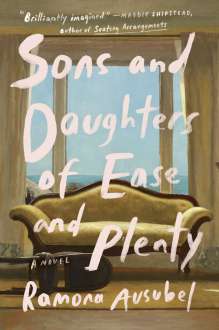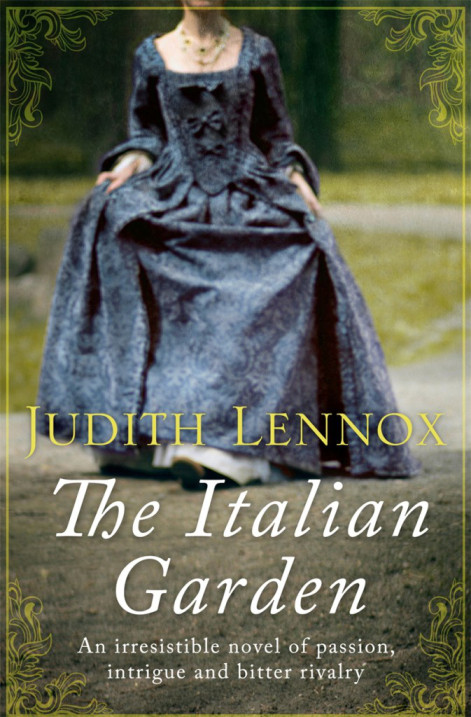I was so eager to read Ramona Ausubel’s Sons and Daughters of Ease and Plenty that I ordered it directly from Washington state. I adored her debut novel, No One Is Here Except All of Us, which was published in 2012, and takes place in Romania during the Second World War. The storyline of Sons and Daughters of Ease and Plenty is rather different, but no less compelling.
 Sons and Daughters of Ease and Plenty, which has been so wonderfully received, begins in Martha’s Vineyard on Labor Day, 1976, and spans generations and decades. Fern and Edgar, who were high-school sweethearts, are holidaying with their three children. Despite their ‘deeply professed anti-money ideals’, both have been living a ‘beautiful, comfortable life’ thanks to Fern’s recently deceased parents. When Fern receives a phone call to inform her that all of the money, which she and her family have been so reliant upon, is gone, their ‘once-charmed’ life unravels immediately.
Sons and Daughters of Ease and Plenty, which has been so wonderfully received, begins in Martha’s Vineyard on Labor Day, 1976, and spans generations and decades. Fern and Edgar, who were high-school sweethearts, are holidaying with their three children. Despite their ‘deeply professed anti-money ideals’, both have been living a ‘beautiful, comfortable life’ thanks to Fern’s recently deceased parents. When Fern receives a phone call to inform her that all of the money, which she and her family have been so reliant upon, is gone, their ‘once-charmed’ life unravels immediately.
Fern and Edgar both leave the familial home on separate adventures, unaware that the other parent has also escaped, and their three children have been left completely alone, in the care of seven-year-old Cricket. As their ‘paths divide and reunite, the characters must make crucial decisions about their own values, about the space they occupy in American history, and about the inner mould of their family.’ Ausubel poses questions regarding their situation, using them to explore the bigger issues of inherited wealth and privilege. Perhaps the most striking of these is: ‘When you’ve worked for nothing, what do you owe?’
When surveying his family’s vacation house, Ausubel writes the following about Edgar: ‘He knew that the summerhouse, the sea view, belonged to him because he paid for them, yet it felt like his bloodstream pumped with this place, like the rocks and waves and saltmuck were in him, that he was of them. But money, old money, got all the press.’ His own parents are wealthy too, enjoying the profits of a successful steel business, which has even allowed them to purchase their own private island in the Caribbean. He has repeatedly been offered a position in the company, which comes with a very healthy salary, but has so far turned it down; he sees himself, rather than a business operative, as an aspiring novelist, writing back against industry and inherited wealth. ‘Being rich,’ writes Ausubel, ‘had felt to Edgar like treading alone for all of time in a beautiful, bottomless pool. So much, so blue, and nothing to push off from. No grit or sand, no sturdy earth, just his own constant movement to keep above the surface.’ Although the family protest about inherited money, when Fern tells Edgar of their wealth running out, ‘It was like announcing a death… The money had lived its own life, like a relative.’
Ausubel writes with such clarity, and there is a wonderful depth to Sons and Daughters of Ease and Plenty. She notices and relays the most minute things back to the reader, making them astonishingly beautiful; for instance: ‘Fern had felt the very specific warmth of Edgar’s skin, different from anyone elses. Suddenly, the car had slowed and they had both jolted forward. The road ahead of them had turned all silver, shimmering and slippery, like mercury had spilled all over it. It had melted like the sea.’ Ausubel’s characters are multi-dimensional, and she has a real understanding both for the adults and children whom she has created. Cricket particularly is an endearing creature; she has been rendered vivid in both her actions and speech, and one warms to her immediately. The family’s story plays out against important elements of social history – the Vietnam war, for example.
Whilst Sons and Daughters of Ease and Plenty has perhaps a more conformist feel to it than No One Is Here Except All of Us, it is no less beautiful. Ausubel deftly and brilliantly evokes a once perfect relationship which soon becomes a troubled marriage, and explores such themes as belonging, trust, the notion of inheritance – both bodily and monetarily, and love. Her prose is thoughtful throughout, and some passages incredibly sensual. Sons and Daughters of Ease and Plenty is a deeply human novel, and I did not want it to end.
Purchase from The Book Depository
Advertisements Share this:




